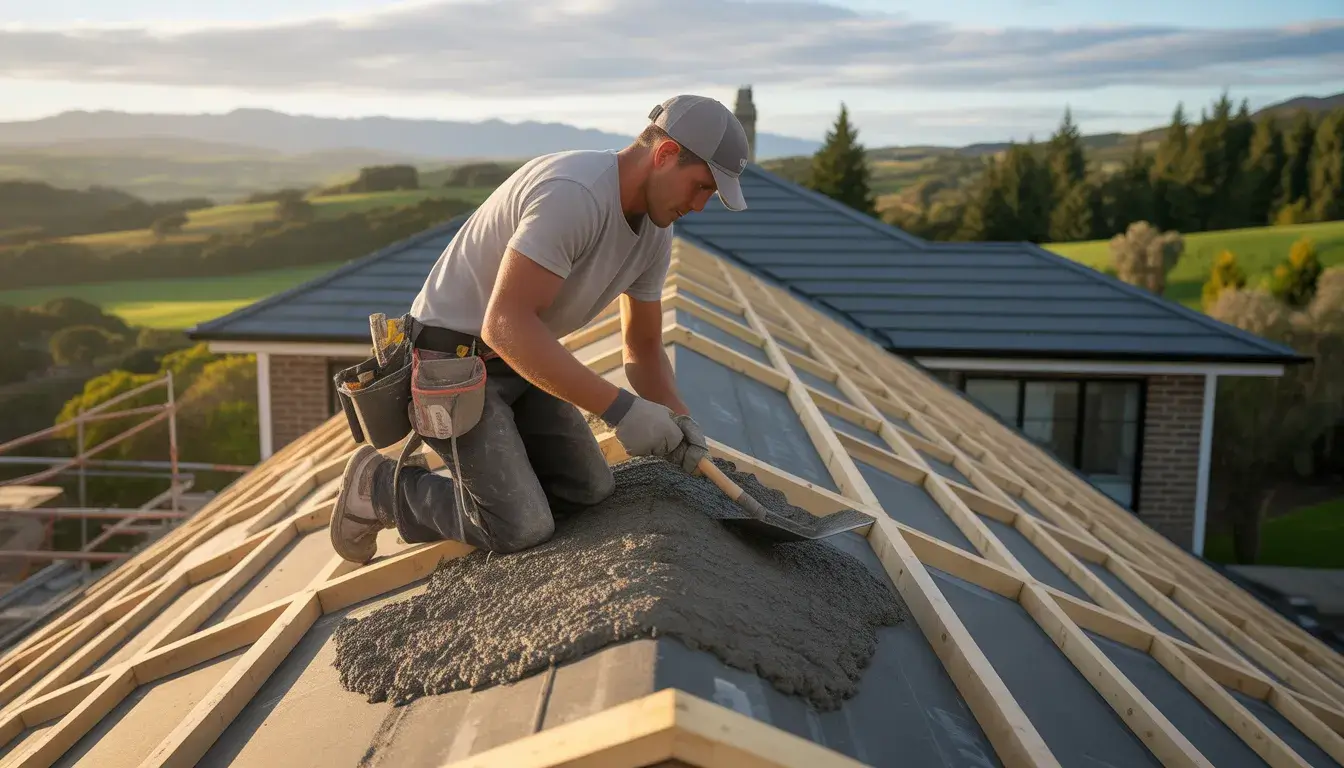
The roofing industry has witnessed many evolutions in recent decades, particularly in how we approach traditional materials like mortar. As Wellington’s weather patterns become increasingly unpredictable and building standards continue to evolve, many homeowners and contractors are questioning whether mortar still belongs in modern roofing construction. The answer isn’t as straightforward as you might think.
At Rockstar Roofing, we’ve worked on over a thousand roofs across the Kapiti Coast and Greater Wellington Region since we started, witnessing firsthand the changing world of roofing materials and techniques. Our experience has taught us that whilst mortar’s role has shifted dramatically, it certainly hasn’t disappeared from modern roof construction.
The Historical Foundation of Mortar in Roofing
Mortar has been the backbone of roofing construction for centuries. This mixture of cement, sand, and water has traditionally secured ridge tiles, hip tiles, and verges, creating weatherproof seals that protect homes from New Zealand’s diverse climate conditions. The material’s ability to bond building components together and distribute loads evenly made it indispensable for generations of roofers.
However, mortar’s greatest weakness has always been its inability to cope with differential movement. Even perfectly applied mortar can fail quickly when buildings experience natural settling, thermal expansion, or ground movement – conditions particularly relevant in Wellington’s seismically active environment.

Modern Building Standards and Their Impact
New Zealand’s building standards have evolved significantly in response to our unique climate challenges and seismic conditions. Modern codes now require that all mortar-bedded roof components be mechanically secured to the roof structure using additional fixings such as nails, screws, or clips.
This shift reflects lessons learned from extreme weather events and the recognition that mortar alone, whilst strong, cannot withstand the dynamic forces that modern roofs must endure. Wind uplift, thermal cycling, and structural movement can compromise mortar bonds, leading to costly repairs and potential safety hazards.
The Rise of Dry-Fix Systems
Dry-fix systems have emerged as a compelling alternative to traditional wet mortar applications. These systems use mechanical fixings, gaskets, and specially designed components to secure roof elements without requiring mortar at all.
The advantages of dry-fix systems are significant. They’re unaffected by weather conditions during installation, require minimal maintenance, and provide consistent performance over time. For busy homeowners who want reliable roofing without ongoing concerns, dry-fix represents a modern solution to age-old problems.
However, dry-fix systems typically carry higher upfront costs and may not suit every architectural style. Heritage homes and period properties often benefit from traditional mortar applications that maintain authentic appearances whilst still meeting modern performance requirements.

The Hybrid Approach: Best of Both Worlds
Today’s most effective roofing solutions often combine traditional mortar with modern mechanical fixing techniques. This hybrid approach leverages mortar’s sealing and aesthetic properties whilst adding the security and reliability of mechanical fixings.
Quality roofing contractors understand that proper mortar mixing remains crucial when this material is used. The sand-to-cement ratio, water quality, and application technique all influence the final result’s durability. Sharp sand provides strength whilst softer building sand improves workability, and the blend of these materials affects long-term performance.
Climate Considerations for Wellington Region
Wellington’s coastal environment presents unique challenges for all roofing materials. Salt air accelerates corrosion of metal components, whilst the region’s wind patterns subject roofs to significant uplift forces. Temperature variations cause materials to expand and contract, potentially compromising mortar bonds over time.
These conditions make proper material selection and installation techniques critical. Experienced local contractors understand how Wellington’s climate affects different roofing systems and can recommend approaches that provide optimal performance in these challenging conditions.

When Mortar Still Makes Sense
Despite modern alternatives, mortar retains important roles in contemporary roofing construction. Heritage restorations often require traditional mortar applications to maintain historical authenticity. Some architectural styles benefit from mortar’s aesthetic properties, particularly where visible ridge lines contribute to a building’s character.
Additionally, smaller-scale applications such as porches or bay window details may still rely primarily on mortar, provided the installation follows current best practices and includes appropriate mechanical reinforcement where required.
Quality Installation Makes the Difference
Regardless of whether you choose traditional mortar, modern dry-fix systems, or hybrid approaches, installation quality determines long-term performance. Proper surface preparation, correct mixing ratios, appropriate curing conditions, and skilled application techniques all influence the final result.
Professional installation also ensures compliance with building codes and manufacturer warranties. Attempting complex roofing work without proper expertise often leads to premature failure and costly remedial work.
The Importance of Regular Maintenance
Even the best roofing systems require periodic maintenance to perform optimally over their intended lifespan. Mortar-based systems may need pointing repairs, whilst mechanical fixings require inspection for corrosion or loosening. Dry-fix systems, whilst low-maintenance, still benefit from periodic cleaning and inspection.
Regular professional maintenance extends roof lifespan, prevents costly emergency repairs, and maintains manufacturer warranties. It’s a small investment that protects one of your property’s most important systems.

Looking Forward: The Future of Roofing Materials
The roofing industry continues evolving, with new materials and techniques regularly emerging. However, the fundamental challenge remains unchanged – creating durable, weatherproof systems that protect buildings and their occupants.
Modern roofing success comes from understanding when to use traditional materials like mortar, when to embrace newer technologies, and how to combine different approaches for optimal results. This requires experience, ongoing education, and commitment to quality that only established professionals can provide.
Making Informed Decisions for Your Property
Whether you’re planning a new roof, considering repairs, or evaluating maintenance options, understanding mortar’s place in modern construction helps you make informed decisions. The choice between traditional mortar, dry-fix systems, or hybrid approaches depends on your building’s specific requirements, architectural style, budget considerations, and long-term maintenance preferences.
Professional consultation ensures you receive recommendations tailored to your property’s unique needs. Experienced contractors can assess your roof’s condition, explain available options, and provide realistic timelines and cost estimates for different approaches.
At Rockstar Roofing, we believe in honest, straightforward advice that helps Wellington homeowners make decisions based on facts rather than sales pressure. Our 100% family-owned business has built its reputation on quality workmanship, transparent communication, and genuine commitment to customer satisfaction.

Protecting Your Investment
Your roof represents a significant investment in your property’s protection and value. Whether it incorporates traditional mortar, modern dry-fix systems, or hybrid approaches, proper installation and ongoing maintenance ensure optimal performance and longevity.
Don’t leave your roof’s performance to chance. Professional installation, quality materials, and regular maintenance provide the peace of mind that comes from knowing your property is properly protected against Wellington’s challenging weather conditions.
Mortar certainly has a place in modern roofing construction, but that place has evolved significantly from traditional applications. Today’s successful roofing combines time-tested materials with modern techniques, creating systems that deliver superior performance whilst respecting architectural heritage where appropriate. The key lies in working with experienced professionals who understand both traditional and contemporary approaches, ensuring your roof provides reliable protection for decades to come.

Comments are closed